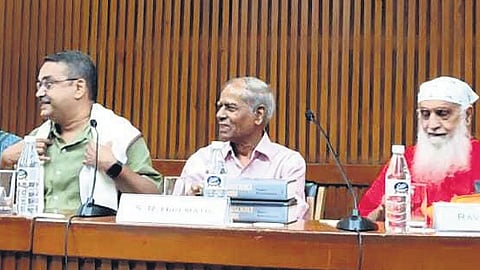

NEW DELHI: At a time when the American visa, and its possible denial, may scotch the ‘American Dream’ of aspiring Indians, journalist and The New Indian Express columnist Sugata Srinivasaraju’s new book, 'The Conscience Network' (Penguin), shows what some young Indians did with their time on American soil and its link with the Emergency imposed by Indira Gandhi in the ’70s.
PhD students Ravi Chopra and Anand Kumar, and S R Hiremath, a Kannadiga who had become a top-notch corporate in the US, was part of a network that was activating the diaspora, at a time when it was just beginning to be influential, in order to save Indian democracy. This they did through an organisation they founded: Indians for Democracy (IFD). The three were present at the book launch at the IIC on Wednesday.
Marching, campaigning, pamphleteering – these young men who had grown up in the first decade of Independence were spreading the word about the dark days at home among US Congressmen and the US media at a time when many Indians back home were silent, defending the Emergency or currying favour with the government.
From California, Chicago and New York, many Indians thus came together in an intuitive way motivated by ideals larger than any materialistic dream. “What we thought was if we want to go back to India and do meaningful work, we can only do it in a democracy,” said Hiremath.
“It is widely believed that it was one of the factors that pushed Mrs Gandhi, who was sensitive about international opinion, to end the Emergency and call for general elections," said the author.
This international pressure was created by ordinary Indians who had not gone there to do politics but found themselves unable to be silent or do nothing, thus "creating a parallel history of resistance,” said Srinivasaraju at the launch.
Theorist and political psychologist Ashis Nandy, activists Dunu Roy and Suhas Borker and journalist Neerja Chowdhury were also part of the panel discussion. Nandy said an undeclared Emergency is trickier than a declared one. “We are now in a worse state. Indira Gandhi’s Emergency was too crude, too vulnerable, which is why it collapsed in two years. The present emergency may be more difficult to subvert,” he said.